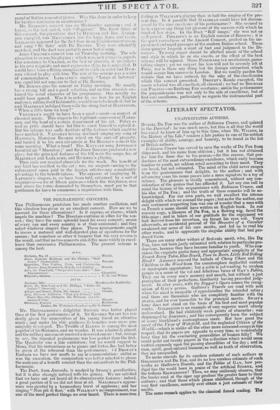THE PHILHARMONIC CONCERTS.
THE Philharmonic pendulum has made another oscillation, and this vibration has given us an excellent concert. How are we to account for these alternations ? Is it caprice, or chance, which impels the machine ? The Directors continue in office for the sea- scn ; they have the same splendid band for every concert ; music of every age and every country is at their command ; and they select whatever singers they please. These arrangements ought to insure a matured and well-digested plan of operations for the- season ; but somehow or other it happens that the very reverse is the result, and that no two concerts can differ more widely in excel- lence than successive Philharmonics. The present scheme is among the best.
ACT II.
Sinfonia (MS.) Mendelssohn Bartholdy. Duct, Mr. Ponehard and Mr. Phillips, " Entro del tempi° " (Jessonda)
Adagio and Rondo, Flute, Mr. Drouet.......... Drouet. Aria, Madame Malibran, "Non pi di Drouet............. with Como Bas,etto, Obligato, Mr. Willman (La Vie-
menza di Tito) ...... ....... ............... Mozart. Overture, Egmont . Beethoven. Leader, Mr. Weichscl—Conductor, Sir G. Smart.
Mr. MENDELSSOHN'S delightful Sinamia was better played than at the first performance of it. Sir GEORGE SMART has evi- dently given the composition of his young friend an attentive study ; and under his able guidance its beauties were more pro- minently developed. The Twelfth of HAYDN is among' the most popular of' his Sinfbnias, and no wander. It was admirably played, and the military movement received a deserved encore ; but, strange to say, the repeated performance was less perfect than the first. The Quartetto was a fine exhibition ; but we would suggest to MORI, that his instructions as to pianos and fortes, &e. bad better be given at the rehearsal than the performance. Of DROUET'S Fantasia we have not much to say in commendation : skilful as was the execution, the composition was better adapted to please the audience of a benefit concert than the subScribers to the Phil- harmonic.
The Duet, from Jessonda, is marked by Sacon's peculiarities, but it is also strongly imbued with his genius. We are satisfied that we have not yet heard all its characteristic features : indeed, a great portion of it we did not hear at all. MALIBRANS appear- ance was greeted by a tremendous burst of applause ; and her singing " Non pill di fioii," with WILLMANS accompaniment, was one of the most perfect things we ever heard. There is more true ACT 5.
Sinfonia, No. 12. Haydn. Duet, Madame Mulibran and Mr. Phillips, "Bell' imago" (Serniramide) .......... ........ ....... . Rossini. Quartette, Two Violins, Viola, and Violonceilo,
Messrs. Mori,Griesbach, Moralt, and Lindley.... Mozart. Aria, Mr. Ponchard, "Suspendez ces Mars " (Les Abeneerrages)
Overture, Oberon Cherutani.
C. M. von Weber. feeling in WILLMAN'S playing than in half the singing of the pre- • sent day. Is it possible that- MALIBRAN could have felt discom- posed by the rare excellence of his performance ? She seemed to us to express any thing but pleasure at the success with which he tracked her steps. In the Duet "Bell' imago," she was not so well paired. PHILLIPS'S is an English version of Rosman ; it is the quiet correctness of the Ancient Concert, grafted on the im- passioned and rapid passages of the modern Italian school. These discrepancies bespeak a want of tact and judgment in the Di- rectors. To every singer should be allotted music of the school and .style in which he or she excels, or the effect of the best scheme will be injured. Mons. PONCHARD is a meritorious, pains- ailing singer ; yet we suspect his loss will not be severely felt at Paris, nor is there any thing but his foreign extraction which would secure him success in London. But we readily pardon the defects that we have noticed, for the sake of the excellencies which this concert presented. DROUET'S Rondo excepted, the music selected was all excellent, all classical ; we had no BocHsas nor PACINI s—no Bartlemy Fair overtures ; and in the performance the preponderance was not only to the side of excellence, but of first-rate excellence, particularly as regards the instrumental part of the scheme.


















 Previous page
Previous page